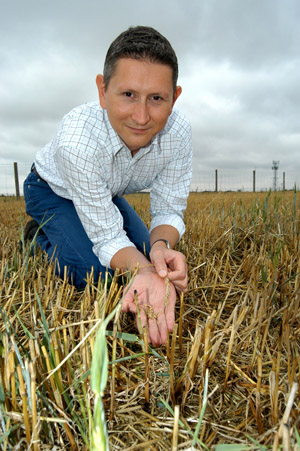
Emerging oilseed rape crops face especially heavy competition from volunteer cereals and grass weeds this season. Difficult harvesting conditions have left a legacy of shed seed which, with the moist soil conditions, will now germinate quickly. The threat of early competition is greatest for the large area of oilseed rape crops established by min till or broadcast sowing.
The beneficial factor in this season's conditions is that volunteers should come as one major flush, which can be quickly and cost effectively snubbed out with a single Fusilade Max application, advises Syngenta Herbicides Technical Manager, Jason Tatnell.
"Application timing is the crucial factor in controlling volunteer cereal competition," highlights Mr Tatnell. "Early action, before the two to three leaf stage, will ensure the crop can continue to establish unhindered." ADAS research has shown the damaging effects of volunteer competition occur in the first three to four weeks of oilseed rape establishment, and that early control of even low volunteer populations will deliver significant yield benefits.
Further trials have shown Fusilade Max control of typical field populations, with up to 150 volunteers per m2, can give yield increases and extra profit worth £190/ha. "Left uncontrolled, volunteer cereal populations may also result in increased disease levels in following first wheat crops, including Take-all, Fusarium and Microdochium nivale," he reports.
Mr Tatnell points out that the greater rainfastness and faster action of Fusilade Max makes it the first choice for quick removal of competition in typically wet autumn conditions.
Young volunteers and grass weeds, including wild-oats and brome, can be very cost-effectively controlled with Fusilade Max with rates as low as 0.4 l/ha, he advises. But if weeds have become stronger - past the three to four leaf stage - then there's the flexibility to increase applications rates.
With ample seedbed moisture there is good potential for oilseed rape crops to establish well and grow strongly through the autumn, shading out further volunteer competition. In some instances, Mr Tatnell acknowledges a follow-up graminicide may be required. "Growers must follow PSD resistance strategy rules, to use an alternative fop and dim herbicide active ingredient for repeat volunteer control applications. Where sequential herbicide programmes are required for cereal volunteer control, Fusilade Max may be followed by actives such as propaquizafop, quizalofop, cycloxydim."
